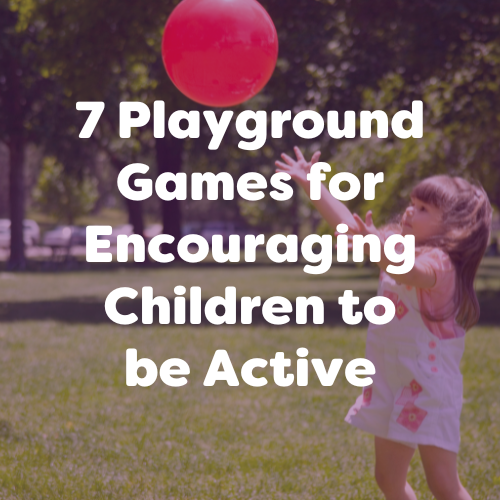Children don’t have long break times, usually between 20-30 minutes. So how can they be encouraged to use this time to do something active? We’ve put together a list of traditional and engaging playground games, ideal for the schools and for helping children improve PE skills, make friends and be in the right mindset for learning afterwards!
1. Donkey Ball Game – Age 4+
Game Difficulty: Beginner
Group Number: Between 2 – 7 players
Donkey is a classic game with many different names. that is fun to try in small groups. This game also works with a tennis racket; line the children up in front of a wall and take it in turns to hit the ball. The same rules apply!
- Ask children to line a short distance from the wall and begin with the first person throwing the ball against the wall and jumping over it when it bounces back.
- If the ball touches the player they gain the letter ‘D’, if it touches them again, ‘O’ and so on until someone spells out the word ‘Donkey’ and they exit the game.
- Keep playing until a winner is found!

2. What’s the Time Mr Wolf? – Age 4+
Game Difficulty: Beginner
Group Number: Between 3 – 12 players
This classic playground game is a fantastic way to improve children’s counting, as well as getting lots of exercise! It’s also great for larger groups of children.
- One child is selected as the ‘Wolf’, who turns their back towards their classmates.
- The rest of the children then chant, ‘What’s the time Mr Wolf?’ who then responds with a time, e.g. ”4 o’ clock‘. The children must then walk forward 4 steps, counting aloud as they go.
- Eventually ‘Mr Wolf’ shouts ‘Dinner time!‘ and turns around to chase their classmates back towards the start point.
- If someone is caught before they reach safety, they then become the next Mr Wolf!

3. Queenie Queenie Who’s Got The Ball?- Age 5+
Game Difficulty: Beginner
Group Number: Between 3 – 8 players
Queenie Queenie is a great game for a group of children to play, though probably no more than 12. The game itself is simple, and just requires something to throw that isn’t too heavy.
- One child is picked as ‘Queenie’ The ‘Queenie’ must then turn their back to the rest of the group.
- The ‘Queenie’ then throws a ball (or other object!) over their shoulder for one of the other children to pick up.
- The ‘Queenie’ then turns back around and the rest of the kids shout; “Queenie Queenie who’s got the ball? I haven’t got it, It isn’t in my pocket, Queenie Queenie who’s got the ball?“
- ‘Queenie’ must then guess who’s got the ball. If the Queenie is struggling, you can make the game harder by asking the children to alternately show their left and right hands. The child with the ball must be careful not to drop it!
- If the child who has the ball is picked last, then they become the next ‘Queenie’!

4. Piggy in the Middle – Age 5+
Game Difficulty: Beginner
Group Number: Between 3 – 5 players
Out of all the playground games, this is one of the most popular! Also known as ‘Keep Away’, it’s a great way to encourage physical activity in children, as well as helping them to practice their throwing and catching skills.
- One child is nominated as the ‘Piggy’, and must stand in the middle of a circle made up of the rest of the children playing.
- A ball (or bean bag!) is then thrown across the circle, and must avoid the ‘Piggy’ in the middle.
- The ‘Piggy’ must try and either intercept the throw, or get the ball if a receiver drops it.
- If they win the ball, the person who either dropped, or threw badly replaces the ‘Piggy’.

5. Hopscotch Playground Games 5+
Game Difficulty: Beginner
Group Number: Between 1 – 6 players
With some chalk or a few colourful number discs, it is easy to set up a game of hopscotch in the playground. Children can practice number recognition and gross motor skills as they jump, hop and balance on each step.
- Set up a grid to play on starting from 1 and ending at 10 and decide on the rules before playing such as what will happen if a player steps onto the wrong square.
- Players line up at the start and the first person begins the game by throwing a counter onto their chosen grid box.
- The player then hops to the top and turns around to hop back (making sure to keep their balance!)
- Once the player has had their turn, they pass the counter onto the next player in line.
- Try playing hopscotch with a twist using alphabet tiles instead of numbers. Throw a matching alphabet bean bag onto the corresponding square to begin.

6. Banana Split Skipping Rope Game – Age 6+
Game Difficulty: Intermediate
Group Number: Between 4 – 12 players
Skipping ropes have always been a great tool for break times. Not only can children progress at their own pace, while still feeling included in an activity, but they can also improve their hand-eye coordination. But skipping doesn’t have to be an individual activity, you can also organise fun playground games such as Banana Split or Double Dutch.
- Use one long skipping rope with two children turning it from either end.
- Children form a line facing the turning rope.
- They then take it in turns to try and pass through the rope – without touching it!
- Once everyone makes it through, two children can then try to pass through together. If everyone succeeds, three children can try at the same time, and so on.
- If the rope ever touches someone, go back to the beginning with just one child attempting to cross.

7. Red Rover Team Playground Game – Age 6+
Game Difficulty: Intermediate
Group Number: Between 6 – 20 players
Some of the best playground activities involve the whole class which makes Red Rover ideal for large groups. Simply, gather up to 20 players in this team-building game which is best played on a grassy field for lots of playground fun. Just remember to hold hands and don’t let go!
- Split all players into two teams with a captain to lead each group.
- All the players in the first team must hold hands and call out a player from the opposing team by chanting “Red Rover, Red Rover. Send (name) right over!”
- The named player will have to run towards the other team fast enough to make them let go of each others hands and break the chain.
- If they break the chain of players they can pick someone to join their own team. However, if they fail to break the chain they must join the opposing team.
- Continue with each team taking turns playing until a winner is decided.

More Playground Games…
There are so many playground group activities for children to choose from and we’ve only scratched the surface! One thing they all have in common is the ability to engage children to take part in a fun activity that helps them be more active in the day. Despite being ‘Games’, they undoubtedly help improve a range of PE Skills including running, throwing and catching. ‘Donkey’ and ‘What’s the Time Mr Wolf?’ even provide an opportunity to practice maths and literacy skills!
We would love to hear what your favourite playground games are! Share your favourites with us on social media!





